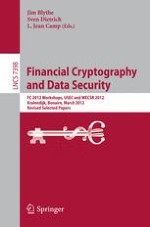This book constitutes the thoroughly refereed post-conference proceedings of the workshop on Usable Security, USEC 2012, and the third Workshop on Ethics in Computer Security Research, WECSR 2012, held in conjunction with the 16th International Conference on Financial Cryptology and Data Security, FC 2012, in Kralendijk, Bonaire. The 13 revised full papers presented were carefully selected from numerous submissions and cover all aspects of data security. The goal of the USEC workshop was to engage on all aspects of human factors and usability in the context of security. The goal of the WECSR workshop was to continue searching for a new path in computer security that is Institutional review boards at academic institutions, as well as compatible with ethical guidelines for societies at government institutions.
